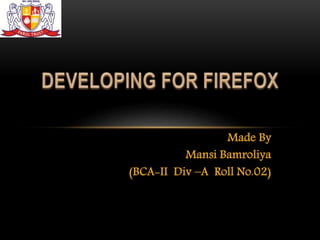Developing for Firefox
- 1. Made By Mansi Bamroliya (BCA-II Div –A Roll No.02)
- 3. INTRODUCTION ? The tech world is in great shape right now, thanks in no small part to a small project that was born in 1998 for this very purpose. ? To a regular person from the 90s, our current world would seem really strange. ? Although there would be a million reasons to account for that, the Internet would take up a huge chunk of those reasons. ? This is because today, a large faction of the community is an active participant in the medium, as opposed to being silent spectators.
- 5. ? As the more tech savvy readers would be aware, Firefox runs on Gecko, a free and open source layout engine. ? So, in essence, you can develop extensions for your browser. We’re using the term ‘extensions’ here is a very broad sense since it means anything created that was not shipped with the plain vanilla browser. ? There are many types of extensions that you can create for Firefox to customise your experience, and (hopefully) others’ as well, by sharing (the love and) the code.
- 6. ? Add-ons are extensions that are generally expected to add some new functionality to your browser, that may include (but is in no way limited to) new key bindings (keyboard shortcuts) and new menu items. ? Plugins are the kind of extensions that try to modify the behaviour of the native Firefox code and thereby the behaviour of the browser.
- 8. ? The Mozilla project has grown way beyond the ‘friendly neighbourhood browser’ stage. The team is working on creating a gamut of technologies and, of course, all of them could use your help! ? The two ways in which Firefox has entered that space are via the mobile browser, Fennec and the mobile operating system, Boot2Gecko (B2G).
- 9. ? Fennec is the name of the Firefox for Android project. ? The project ports Gecko to run on one of the largest, while at the same time fastest growing, platform of our time – Android. ? Boot to Gecko (B2G) is the official nickname for Firefox OS. ? As you can guess by the name, Boot2Gecko attempts to cut out the middleman and have the whole phone just running Firefox and apps.
- 10. ? Mozilla is working with the W3C and other stakeholders to ensure that the Web APIs are an open standard and that other browsers adopt them too. ? Now, on to what you need to develop for the platform – almost nothing! ? All you need is the OS simulator which can be downloaded from AMO, and installed as a regular add on to your browser. It will provide the basic testing ground that you need for your experiments with the system as you get your feet wet.
- 11. ? There are also numerous side projects initiated by the foundation which attempt to change the web for the better. We’re about to discuss some of the more frontline projects as part of that initiative. ? The Web maker Project is built around the idea that passive users of the internet can be people who contribute to the ‘making’ of the internet.
- 12. ? What it provides is a WYSIWYG (What You See Is What You Get) editor, and an interface to build simple content for the web. ? This includes, in its own words, Popcorns and Thimbles. Popcorn is a tool to create and maintain effective video based interactions, while Thimble is used to prepare web pages. ? It provides a very easy tousle interface, with a focus on acquainting the user with the basics of web development. One of the most important aspects of the tool is that it’s an initiative driven by the force of the community, and that all of the innovations are openly available.
- 13. ? The Mozilla App Maker is a brand new project aimed at simplifying the process of development of mobile apps for everyone. ? And everyone means everyone here – including the folks who don’t have a significant digital skillset. ? Although many attempts have been made to simplify and effectively automate the process of app development, to be honest, none of them have really panned out. The market is ripe for an initiative of this kind, and who better than Mozilla to make the first significant moves.














